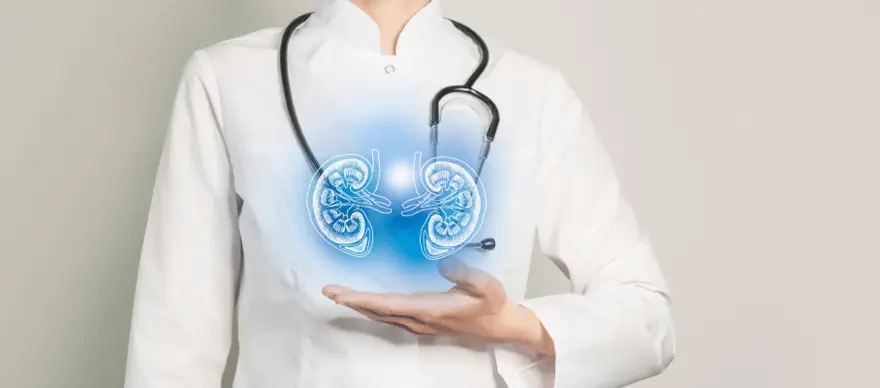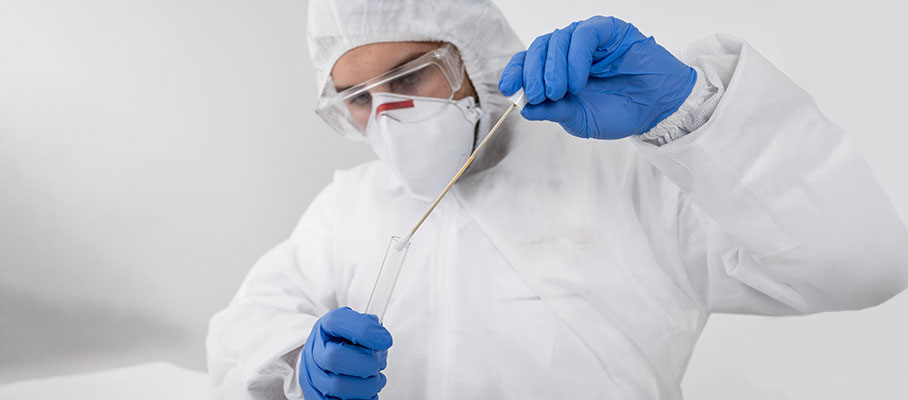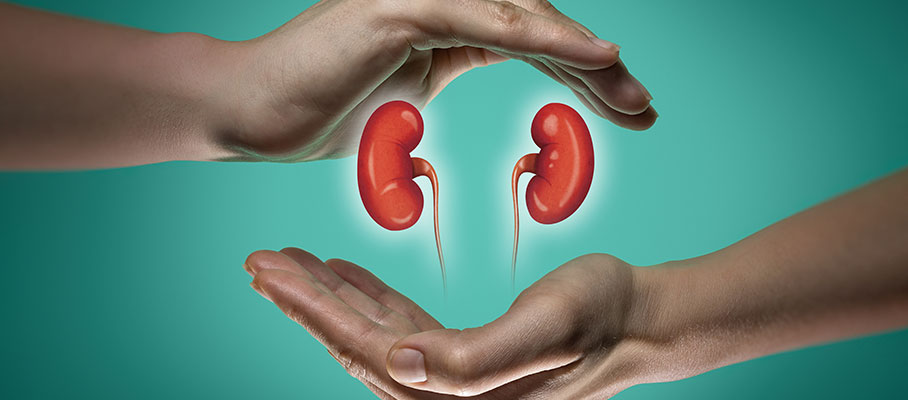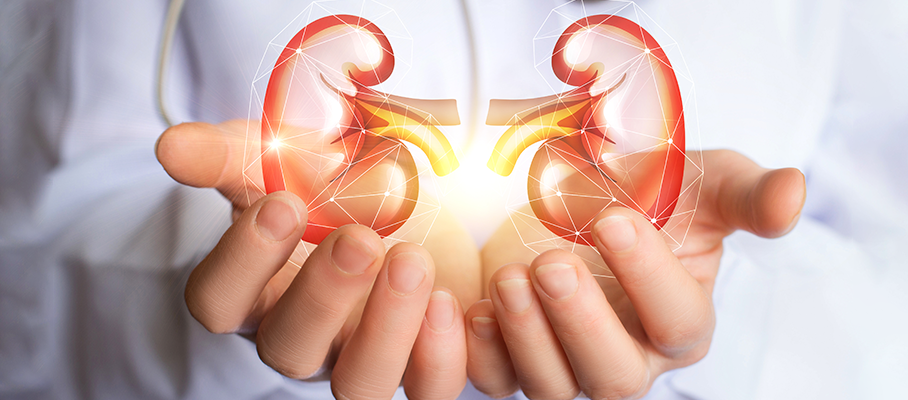Latest Blogs
Could you need a Kidney function test? Find out here
Your kidneys are two bean-shaped organs, located just below the rib cage, near the middle of your back. Each of them is about the size of your fist. The kidneys help your body remove waste and extra water from the blood in the form of urine, reabsorb nutrients and maintain the balance of ions and electrolytes (such as sodium, potassium, and calcium). Moreover, they are also involved in producing hormones that help in controlling blood pressure and stimulating bone marrow to produce red blood cells. Help your kidneys stay healthy with regular monitoring. Book a kidney function test here. Kidney disease is more common than you think! Chronic kidney disease (CKD) is being identified as a leading public health problem globally. The worldwide prevalence of CKD is estimated to be around 13.4%. Between 4.902 and 7.083 million people affected with end-stage kidney disease (ESKD) are in need of kidney replacement therapy. Earlier older people were more commonly diagnosed with kidney conditions. But nowadays, it is not uncommon for young adults to develop them, say health experts. How can you assess your risk of getting a kidney disease? Certain risk factors can increase your chances of developing a kidney disease. People who have an increased risk of kidney-related problems should get their kidneys tested more often so as to spot any condition early on and start with the treatment. Here are top 6 questions to ask yourself to know if you need a kidney function test: Do you have a family history of kidney disease? Family history is a strong predictor of having kidney disease. People whose family members have been diagnosed with end stage kidney disease were found to report an increased prevalence of chronic kidney disease. If you are unsure about your family history of kidney disease, ask and get to know. Are you over 30 years of age? Just like other organs, your kidneys also age as you age. Even in people without kidney disease, glomerular filtration rate (GFR) declines with advancing age. What does GFR mean? It is a very important test that checks how well your kidneys are working. To be more specific, GFR values estimate how much blood passes through the tiny filters in the kidneys (glomeruli) every minute. A normal GFR value is 60 or above. If your GFR is below 60 for three months or more, your kidneys may not be functioning well and you may need to consult an expert and get tested more often as advised. A GFR less than 15 may indicate the need to get started on dialysis or have a kidney transplant. Is your blood sugar levels high? Diabetes that causes high blood sugar levels is the leading cause of kidney failure. It accounts for 44% percent of new cases. Uncontrolled diabetes can lead to damage to blood vessels in your kidneys. Over time, this causes kidney failure. People with diabetes should be vigilant of their blood sugar status. Do you have high blood pressure? High blood pressure causes your heart to work harder. In fact, it leads to damage to blood vessels over time. Arteries around the kidneys get narrowed, weakened or hardened due to high blood pressure. This results in inability of these arteries to deliver sufficient amounts of blood to the kidney and causes damage to the kidneys. In general, it is important to keep blood pressure below 130/80 to prevent kidney damage. Apart from high blood pressure, other conditions including stroke, heart attack, or heart failure can also increase your risk of getting your kidneys damaged. Are you overweight or obese? Obesity is a potent risk factor for kidney disease. It increases the risk of developing major risk factors for chronic kidney disease (CKD), like diabetes and hypertension. Moreover, it has been seen to have a direct impact on the development of end-stage renal disease. Do you smoke? (and not even trying to quit) As per some reports, people who smoke are three times more likely to have reduced kidney function than people who don’t smoke. Smoking causes hardening of arteries and impedes the blood flow to the kidneys. Also, it can make an existing kidney disease worse. Early kidney disease is a silent problem So, pay attention! You may have kidney disease and do not have any symptoms, especially in the early stages. It might happen that your condition is progressing but you do not feel ill. Some other people can only experience mild symptoms like nausea, fatigue, etc. Hence, it is important to beware of your risk of kidney problems and get yourself tested from time to time. Check with your doctor as to what the kidney test results mean and if you need any medical intervention.Looking to book a comprehensive health package? Get 32 parameters checked TruHealth Master Test here.
What to eat and what not to if you have kidney disease
Kidneys are one of the vital organs needed by your body for survival. These bean-shaped organs on the sides of the spine help in removing waste and filtering your blood. They are also responsible for performing important functions like releasing hormones to control blood pressure, balancing fluids in our body, cleaning our blood from waste products, etc. When functioning normally, these fist-sized powerhouses filter 200 liters of blood each day, producing around 800-2,000 mL of urine (with 2 liters of water intake). There can be a few unattended reasons that could lead to this vital organ’s damage. Apart from diabetes and high blood pressure, obesity, smoking, genetics, and sometimes age factor also are some factors that contribute to kidney damage. It is surprising to know that 10% of people globally suffer from some or the other form of chronic kidney disease. The best way to keep track of your kidney health is to get a kidney function test done. Book your test now (your kidneys will thank you later!) Book Kidney Function Test Here Diet for kidney disease Making healthy food choices is important for all of us, but it is significantly important for people with chronic kidney disease. If the kidneys are not functioning up to their maximum capacity, there can be problems in waste secretion, leading to the waste being built up in the blood. In order to help the kidney perform the function of getting rid of toxins and excess fluid from our body, a kidney-friendly diet can be an approach to follow. The dietary changes vary depending on the level of the damage done. For people with advanced kidney problems, the restrictions are more; the diet simply helps decrease the amount of waste in the blood and boosts the kidney to perform its functions optimally. This kind of diet is also known as a renal diet. Broadly speaking, it is recommended that people with kidney disease should take the right amount of proteins, calories, vitamins, and essential minerals while cutting down on sodium, potassium, and phosphorus. Given below are some foods that people with kidney disease should include in their diet: Garlic- Since people having kidney issues have to lower their salt intake, eating garlic serves as a nice alternative, making the food delicious and flavourful and at the same time providing added benefits of vitamin C, vitamin B6, and sulfur. Olive oil- Olive oil is always considered a healthy choice for cooking, thanks to its anti-inflammatory properties due to oleic acid and low phosphorus and sodium content. Cabbage- This leafy vegetable from the cruciferous family is a storehouse of essential vitamins such as vitamin K, vitamin C, and vitamin B. It helps in regular bowel movements and is considered good for your kidney. Cauliflower and broccoli- Being low on sodium and phosphorus, this can be used as an alternative for potatoes in mashed form. Cauliflower contains vitamin C, vitamin K, and vitamin B acts as a good source of fiber and has anti-inflammatory compounds like indoles. Onions- When on a renal diet, your sodium intake falls. Sautéed onions with garlic in olive oil add flavor to an otherwise tasteless dish and give you the essential dose of vitamin C, vitamin B and has prebiotic fibers that keep the digestive system running and healthy. Radish- Eating salads with radish during winters is a delicious way to get all the essential vitamins and rich nutrients. Radish is not just a boon for kidney problems but also helps with cataracts and heart diseases. Pineapple- Pineapple is a tropical food low in potassium and high in fiber, manganese, and vitamin C. It contains bromelain which is an enzyme that helps in inflammation reduction. Macadamia nuts- Peanuts and almonds might be rich in phosphorus and not recommendable in the renal diet, but macadamia nuts are healthy and loaded with magnesium, copper, and healthy fats with vitamin B. Not aware of your current sodium, potassium, and other electrolyte levels? Stay in the know with our electrolytes test. Here are some foods that you should avoid if you are suffering from any form of kidney disease: Soda- Sodas are not only high in sugar and calories but also have phosphorus in large amounts as many manufacturers add them for enhancing the flavor. Therefore when following a renal diet, soda should be avoided as far as possible. Whole wheat bread- Though considered rich in fiber and healthier, some experts advise people undergoing kidney disease treatments to opt for white bread. Bread also contains sodium, so it is best to eat it less when on a renal diet. Bananas- What otherwise are considered a very healthy source of potassium, on a renal diet bananas are not a very wise choice, instead one can go for pineapples among other tropical fruits. Tomatoes: Following a renal diet limits a lot of food options for a person. Tomatoes are present in many dishes, and contain a lot of potassium not suitable for individuals on a renal diet; any alternative to it has to suit the taste buds as well. Dates and raisins- To make sure your potassium levels are maintained, dried fruits are not recommended. They contain potassium that can hamper the renal diet and hence should be limited to a certain extent if not completely avoidable. Pickles- Pickles or processed olives are very high in sodium, as they are fermented so that they taste less bitter. Processed meat- Also considered unhealthy because of its preservative content, it is loaded with sodium and proteins. Consumption in check works well for processed meats. Canned food- Beans or soups or veggies that are canned are convenient when on the move, but may not work in favor of your kidney. They are rich in sodium and are best to overall reduce their purchase or find better and fresher alternatives for the same. Apart from providing the necessary fuel to the body, what you eat also forms the building blocks for your cells. You really are what you eat, and your food can, and does affect your health in multifold ways. When you have chronic kidney disease, one way to feel better and protect your kidneys is to take a fresh look at what you eat. It cannot be stressed enough how important it is to discuss with your doctor to understand all that you can do for the kidneys to function well. The list of diet dos and don'ts mentioned above may seem a little daunting at first but when you see the effects, they are paramount. Learning how to infuse different spices and seasonings in your dishes can help you reduce your salt intake. Your dietary needs may continue to shift and will require monitoring if your kidney disease progresses. Start by making small changes to your diet today!
Creatinine Serum Test: Purpose, Preparation, Normal Range and Results
Creatinine is a waste material that is produced during the normal wear and tear of the muscles of the body. Your muscles have a high-energy molecule, called creatine phosphate. Creatinine is the by-product of creatine phosphate, which is produced at a constant rate and cleared from the blood by the kidneys. Each one of us has creatinine in the blood. If the creatinine clearance is decreased, it results in increased blood (or serum) creatinine. A rise in serum creatinine is an indicator of kidney impairment and creatinine serum test would help you find that out. What is Creatinine Serum Test? The creatinine serum test is a blood test that measures the level of creatinine in your blood. It's part of a group of tests that are used to find out how well your kidneys are functioning (renal function tests). This blood test is usually done when your doctor thinks that your body isn't getting rid of the waste properly. Indications of a Creatinine Serum Test The creatinine serum test is important because it can give doctors various indications, such as: - To measure the level of creatinine in the blood. - To determine how well the kidneys are functioning. - To diagnose kidney disease. - To monitor kidney function during and after treatment for kidney disease. - Check whether your kidneys are facing the side effects of the drugs you take. When do you need a creatinine serum test? Your healthcare specialist might prescribe you this test if you have symptoms of kidney disease, including- Anorexia (an eating disorder characterized by low weight and food restrictions) Frequently painful urination Foamy or bloody urine What is The Normal Level of Creatinine? The normal range of creatinine varies with age, race, gender, and body size. In general, The normal range of creatinine for adult men: 0.74 to 1.35 mg/dL The normal range of creatinine for adult women: 0.59 to 1.04 mg/dL In general, while muscular young or middle-aged adults may have more creatinine in their blood than the general population, elderly people may have lower creatinine. For people who are dealing with malnutrition, severe weight loss, and chronic conditions, creatinine levels might be lower than other people of the same age group, owing to a reduction in muscle mass over time. When Do You Need a Creatinine Serum Test? You may need to get your creatinine levels tested if you have symptoms of kidney disease, are at risk of getting kidney problems, or want to check your kidney health. The following symptoms can be suggestive of health issues related to the kidneys: -Fatigue, not attributed to any other cause -Puffiness around the eyes -Swelling in your feet and/or ankles -Frequent and painful urination -Foamy or bloody urine Your risk of getting kidney disease is higher if you have: -A family history of kidney disease -Type 1 or type 2 diabetes -High blood pressure Is knowing Creatinine Values Tell my Doctor if my Kidneys are Working Properly? Your doctor needs to look at how much creatinine is in your blood along with some other important parameters as well. The reason is creatinine levels in your blood can be affected by your age, race, gender, and body size. The best way to know if your kidneys are functioning well is to look at your glomerular filtration rate (GFR) and creatinine. GFR is a measure of how much blood passes through the tiny filters of the kidneys (glomeruli) each minute. If the kidneys are damaged, they shall pass lesser blood to get filtered. Please note that creatinine is considered a late marker of acute kidney injury because kidney function is decreased by almost 50% before a rise in serum creatinine is observed. What Do Raised Creatinine Levels Indicate? Any health condition that impairs the function of your kidneys is likely to cause a spike in creatinine serum levels. It is equally important to identify whether the condition and process leading to kidney dysfunction are recent or chronic. While recent elevations may be more easily reversed and treated, chronic conditions might be difficult to deal with and demand special care. The most common causes of chronic kidney disease include -High blood pressure -Diabetes. Other causes of elevated blood creatinine levels are: Consumption of a large amount of meat in the diet Certain drugs (for example, cimetidine) Kidney infections, abnormal muscle breakdown (rhabdomyolysis), and urinary tract obstruction. How Do You Prepare for a Creatinine Serum Test? There are a few things you can do to prepare for a creatinine serum test. First, it is important to fast for at least 8 hours before the test. Second, avoid strenuous exercise for 24 hours before the test. Third, avoid taking any medications that could interfere with the test results. Finally, be sure to drink plenty of fluids to keep your body hydrated. How is Creatinine Serum Test Performed? A Creatinine Serum Test is a blood test that measures the levels of creatinine in your blood. If your kidneys are not working properly, the levels of creatinine in your blood will increase. The test is usually ordered when your doctor suspects that you may have kidney disease. It can also be ordered to check how well your kidneys are working after a kidney transplant. Blood test: a small sample of blood will be taken from a vein in your arm. The sample will then be sent to a laboratory for analysis. Urine test: You have to collect your urine sample and submit it to the laboratory for analysis. Result of a Creatinine Serum Test The result of a creatinine serum test is used to determine the following- Serum Creatinine Level The amount of creatinine in your bloodstream and the creatinine filtration rate in your body should be stable, if not constant. Serum creatinine level is the amount of creatinine present in your blood and is measured in milligrams per deciliter (mg/dL). The average serum creatinine level ranges between 0.74 - 1.35 mg/dL (65.4 - 119.3 micromoles/L) in adult men, while it should lie between 0.59 - 1.04 mg/dL (52.2 - 91.9 micromoles/L) in healthy adult women. An increased serum creatinine level is indicative of poor kidney health. Glomerular Filteration Rate (GFR) The creatinine serum test result determines your glomerular filtration rate (GRF). The glomerular filtration rate is the volume of plasma filtered by the glomeruli per second. GFR is used to check whether the kidneys are functioning correctly. Since blood creatinine levels vary from person to person, the GFR can give a more accurate indication of renal function. It is calculated based on several factors, including serum creatinine count, age, gender, etc. A GFR below 60 points toward renal disorders. Creatinine Clearance The removal of creatinine from the bloodstream by the kidneys, which is later excreted as urine, is measured as creatinine clearance. The creatinine measurement in 24-hour urine and blood samples is typically used to calculate creatinine clearance. Therefore, it's essential to collect these samples at the proper time. Creatinine clearance is measured as milliliters of creatinine per minute per body surface area (mL/min/BSA). Men's typical creatinine clearance range from 19 - 75 lies between 77 - 160 mL/min/BSA. Creatinine clearance in women varies from one age group to others follows- 18 - 29 years: 78 - 161 mL/min/BSA 30 - 39 years: 72 - 154 mL/min/BSA 40 - 49 years: 67 - 146 mL/min/BSA 50 - 59 years: 62 - 139 mL/min/BSA 60 - 72 years: 56 - 131 mL/min/BSA Low creatinine clearance indicates poor kidney function and renal disorders. Albumin/Creatinine Ratio The albumin/creatinine ratio is yet another way to evaluate the urine creatinine count. Albumin is a protein in the blood, essential to prevent it from leaking through the veins and arteries. There should be little or no albumin in the urine, as healthy kidneys often do not filter it out of the blood. The albumin/creatinine ratio quantifies a urine sample's albumin to creatinine ratio. It is measured as the ratio of albumin in milligrams (mg) to creatinine in grams (g). The results are typically less than 17 mg/g in healthy adult men, while they should fall below 25 mg/g in healthy adult women. A higher albumin/creatinine ratio indicates diabetic nephropathy, also known as diabetic kidney disease. What Should I Do After Getting My Creatinine Serum Test Results? It is important to tell your doctor about any medicines you are currently taking, both prescription and over-the-counter. Some drugs, like cimetidine, chemotherapy drugs, cephalosporin antibiotics, may increase your creatinine levels and impact your test results. Your doctor may take this into consideration when interpreting your lab test results. Get Geared up for a Better Kidney Health Your kidneys are vital organs that help remove toxic body wastes and optimize your health. Along with getting your serum creatinine and kidney function checked from time to time, keep yourself hydrated and include fresh, leafy vegetables in your diet. Being physically active also helps your kidneys stay healthy and well-functioning. Conclusion The creatinine serum test is a test that is used to detect kidney dysfunction. The kidneys are responsible for filtering blood and ridding the body of waste products, so if they are not working properly, it can lead to a buildup of creatinine in the blood. This test is often ordered as part of a workup for someone who is experiencing kidney failure. This test can also be used to determine the cause of high creatinine levels that are a result of dehydration.
6 Tips: How To Keep Your Kidneys Healthy By Maintaining a Healthy Lifestyle & Diet
Maintaining the good health of your vital organs is important for healthy living. When we talk about vital organs, kidneys often take a backseat. These are a pair of bean-shaped organs, each about 4 or 5 inches long, located at the base of the rib cage. These multitasking organs are responsible for critical functions like the removal of wastes and toxins from the body, production of certain hormones, induce formation of red blood cells, and regulation of extracellular fluid volume, blood pressure, acid-base balance, and electrolyte concentrations. While your kidneys work hard day in and day out to keep you going, are you sure you are doing the right things to keep your kidneys healthy? Here are 6 simple rules you should definitely follow to keep your kidneys healthy: 1. Maintaining a healthy body weight Staying fit is really important for your kidneys because obesity can lead to high blood pressure which is bad for your kidney health. Regular physical activity can prevent weight gain, high blood pressure, and the risk of chronic kidney disease (CKD). Reduced physical activity and performance have been observed in CKD patients as compared to the general population. Several studies suggest that exercise involvement can improve several health parameters in CKD patients. Aerobic activities like walking, running, skiing, jogging, cycling, dancing, and swimming are great for your health. Try to work up slowly for at least 150 minutes every week. But, don’t overexert yourself, be mindful of how much exercise you do. If you are not keeping yourself active now, discuss with a fitness expert before beginning any new workout program. 2. Keep sipping water often Water helps the kidneys remove toxins from the blood and make your body free of waste material. It also helps in preventing kidney stones and urinary tract infections. It is a popular belief that everyone should drink eight glasses i.e., approximately 2 liters of water per day, but since everyone’s body is different, daily water requirements also differ from person to person. How much water you require depends on factors like age, climate, exercise intensity, health conditions, etc. Staying hydrated is good for your kidneys but don’t overdo it as no studies have proven that over-hydration can enhance kidney function. People who have previously had kidney stones are advised to drink a bit more water to help prevent stone deposits in the future. If you have kidney or heart or liver disease, consult your healthcare provider on the adequate water intake for your condition. 3. Do not overdo OTC pills Prolonged use of over-the-counter (OTC) drugs such as non-steroidal anti-inflammatory (NSAIDS)/ pain-killer (e.g. drugs like ibuprofen) may harm your kidneys. People with healthy kidneys who take the medicines occasionally are likely in the clear. However, if you have kidney disease or decreased kidney function, taking medicines without consulting a doctor should be strictly avoided. 4. Assess your risk and get tested If you or your family have a history of kidney failure, diabetes, high blood pressure, or obesity, get your kidney function checked. Also, remember to keep your blood glucose numbers and blood pressure levels close to the healthy goals. Diabetes and high blood pressure both are leading causes of kidney problems. If you don’t have any symptoms of high blood pressure or diabetes or you are not aware of your family health history, still you could be at risk. So, the best way to know your kidney’s health is to get your health tests done regularly. This helps to identify any health condition at an early stage, and take action to slow or prevent future damage. 5. Eat healthy diet Healthy food choices can help to maintain ideal body weight, prevent diabetes, hypertension, heart disease, and other conditions associated with CKD. Eat healthy foods like fresh fruits and vegetables, whole grains, and low-fat or fat-free dairy products. Cut down on salt and added sugars. Aim for a low-sodium diet, no more than 2,500 milligrams of sodium a day. Limit your added sugar intake to less than 10 percent of your total daily calories. Check food labels to see how much salt and sugar is in a serving. Don't eat too much fatty food, restaurant food, processed meats, and other kidney-damaging foods. 6. Quit smoking and limit alcohol intake Try to quit smoking completely and limit the amount of alcohol you consume. Smoking and drinking alcohol both raise your blood pressure. High blood pressure is one of the most common causes of chronic kidney diseases. Smoking can damage blood vessels, which decreases blood flow to the organs, including kidneys. When the kidneys have inadequate blood flow, they can’t function optimally. Smoking also increases the risk of developing several cancers including kidney cancer. When you quit smoking, your risk will drop. Quitting smoking can be extremely difficult, but you can seek the help of an expert to start your smoke free journey now. If you drink alcohol, it is advised to limit your alcohol intake to one drink per day if you are a woman and two drinks per day if you are a man. One drink is roughly 14 grams of pure alcohol found in 12 ounces of a regular beer or 5 ounces of table wine or 1.5 ounces of hard liquor. Get, set, go! Now you know the simplest rules that can help keep your kidneys healthy. Remember, they are vital to your overall health and well-being. So, start taking good care of them.
Metropolis announces launch of New Antibody Test for Major Kidney Disease
*Keeping pace with newer biomarkers in Autoimmunity- new antibody test launched for renal disease* 11th March 2015: One of the major kidney diseases, Nephrotic Syndrome is defined by massive continued loss of urinary proteins and edema (water retention). One of the major causes of Nephrotic Syndrome is Membranous Nephropathy or Membranous Glomerulonephritis which is a chronic inflammatory disease of the glomeruli (the network of capillaries in kidneys that perform the first step in filtering blood). In Membranous Nephropathy, an antibody-antigen complex otherwise called as the immune complex is formed in the glomerulus. This eventually leads to loss in kidney function and kidney failure. Membranous Nephropathy can be primary (where cause of the disease is not known; idiopathic) or could be secondary (as a result of an underlying condition like prolonged infection, tumor, cancer and even certain medications etc). It is important to differentiate primary and secondary since the treatment and disease management varies. In Primary Membranous Nephropathy, an individual undergoes an immunosuppressive therapy or kidney transplant), whereas in secondary, the underlying disease is treated. PLA2R Antibody Test is used to correctly differentiate the two kinds of disease, evaluate the intensity of the disease, monitor therapy and risk assessment after kidney transplant. Advantages of the test Serum based test and requires only a blood sample Easy to perform Presents a non-invasive alternative to the common biopsy. Anti-PLA2R autoantibodies are a highly specific and sensitive marker for primary MN. Additionally to its usage in differentiation of primary and secondary MN, the anti-PLA2R titer reveals a high predictive value for: Disease evaluation Anti-PLA2R autoantibody results correlate with disease activity (proteinuria). High titers are directly proportional with a severe course of primary MN. Therapy monitoring The anti-PLA2R autoantibody titer decreases in patients undergoing successful immunosuppressive therapy. A relapse of disease is associated with a recurrence of the antibodies. Furthermore, a high anti-PLA2R titer was identified as a considerable risk factor for primary MN patients to not achieve a remission of proteinuria. Risk assessment Up to 40 % of patients with primary MN experience a relapse after kidney transplantation. This risk is particularly high if anti-PLA2R autoantibodies are persistently found during the six months after organ transplantation. Therefore, the titer can be useful to assess the necessity and intensity of an immunosuppressive therapy after transplantation to avoid relapses. Commenting on the test, Dr Deepak Sanghavi who heads the Immunochemistry section at Metropolis Healthcare said “It is an important test that will help improve outcomes and disease management in such a chronic kidney disease. We have tied up with few hospitals and Institute of Kidney Diseases and offer this test at INR 4,500. Out of the suspected samples that we receive, almost 4 out of 10 returns positive”
 Home Visit
Home Visit Upload
Upload


















 WhatsApp
WhatsApp